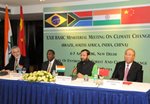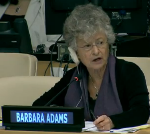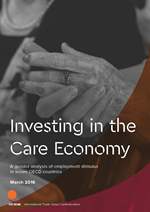Social Watch News
Published on Fri, 2016-04-08 14:56
At their first meeting since the Paris climate summit, Ministers and representatives from Brazil, South Africa, India and China (BASIC) reiterated the importance of raising pre-2020 actions in building trust amongst the Parties to pave the way for the implementation of the Paris Agreement. The ministers noted with concern the pending ratification by many Annex I Parties (developed countries) of the Doha Amendment which established the second commitment period of the Kyoto Protocol (2013-2020), urging Annex I Parties to both ratify and revisit their pledges of Quantified Emission Limitation and Reduction Objectives to close the emission gap. |
Published on Wed, 2016-04-06 13:44
What do the human rights principles of equality and non-discrimination mean for tax policy? This is the question at the center of the first in a series of four advocacy tools on tax policy and human rights produced by RightingFinance. The aim of the advocacy tools is to assist education and dissemination of the standards on tax policy and human rights contained in a report produced by the UN Special Rapporteur on Extreme Poverty and Human Rights in 2014 (“the report”). Each of them contains a section on the normative foundations of the principles in question, another on their applications to tax policy – including explanations and references to practical examples – and a third one with guiding questions for reflection. |
| Published on Tue, 2016-04-05 10:19 |
Published on Thu, 2016-03-31 14:26
During the session on “accountability and transparency of multi-stakeholder partnerships” held in the framework of the Partnership Forum at the UN, Barbara Adams from Global Policy Forum and Social Watch said that partnerships are based in a win-win dynamic but there is a need to understand of what is "win-win". Would be beneficiaries of such initiatives have to be included, she argued. "We need to look and see how the contribution of partnerships has benefits. We need a more systemic approach when we are looking at the win-win approach". |
Published on Wed, 2016-03-30 14:49
More public investment in caring infrastructure is well warranted under existing evidence, is the message that emerges from a new study released recently by the ITUC (“the study”). The study shows that investment into the care economy of 2 per cent of GDP in just 7 countries would create over 21 million jobs and help countries overcome the twin challenges of ageing populations and economic stagnation. Investing in care narrows the gender pay gap, reduces overall inequality and helps redress the exclusion of women from decent jobs. |
Published on Tue, 2016-03-29 14:26
The United Nations Conference on Trade and Development (UNCTAD) concept of interdependence between countries and policy areas can be employed in the follow-up and monitoring of the implementation of the 2030 Agenda for Sustainable Development, says a recent policy brief of this international agency. UNCTAD argues that the 2030 Agenda for Sustainable Development substantially increases the demand for evidence-based analysis and integrated and coordinated policy support. |
| Published on Fri, 2016-03-25 15:03 |
Published on Fri, 2016-03-25 11:14
The United Nations Special Rapporteur on the situation of human rights in the Palestinian territories occupied by Israel since 1967, Mr. Makarim Wibisono of Indonesia, has stressed the critical need for the international community to increase its protection of the Palestinian population. Mr. Wibisono, who has resigned because of Israeli non-cooperation with his task, while presenting his final report to the Human Rights Council, recalled the well-documented violations related to the Israeli occupation policies and practices in the Occupied Palestinian Territory (OPT), and appealed to the Government of Israel, as the occupying power, to take practical steps to implement protections under international law as it pertains to the Palestinian population living under occupation. |
Published on Thu, 2016-03-24 10:44
Freedom of association is an enabling right that underpins inclusive development. The social movements that have flooded the streets of the Arab Spring have the potential to democratize the state and secure democratic transition. However, what Europe calls "Southern Neighbouring" countries are recording alarming shrinking space for civil society, violations of freedom of association and peaceful assembly, coupled with restrictions of the right to access to information and challenges in mobilizing financial resources. |
Published on Wed, 2016-03-23 00:00
Fiscal policy—that is the raising and spending of public resources—is one of the most important structural policies which determines the degree to which a State can ensure human rights for all, without discrimination. As evidenced in the first-ever thematic audience on fiscal policy and human rights held by the Inter-American Commission on Human Rights (IACHR) this past October, who pays for what public services, and who truly benefits, are fundamental questions at the heart of any efforts to protect democracy and realize human rights. Why is tax and fiscal policy essential to realizing economic, social, cultural and environmental human rights (ESCER) in the United States? |
SUSCRIBE TO OUR NEWSLETTER










